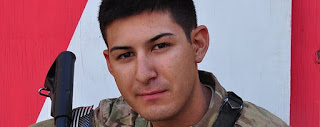
Musings by Linda Cuellar, Ed.D., Community college educator, journalist, video writer and producer who writes and wonders on topics about her life and family, the media, education, border culture, language, travels and U.S. - Mexico issues and topics.
Total Pageviews
Search This Blog
Saturday, October 22, 2011
How The Kitchen Floor Taught Me An Important Lesson

Monday, October 17, 2011
There's a thread that ran through this past weekend: seeing sports from new points of view. First, I added a third Zumba class to "dial up" my weekly exercise. Dancing to Zumba is a sport of a kind, I'll admit I'm stretching the point, but that's OK.
Next in my sports trifecta I saw the excellent movie, "Moneyball," which is less a sports movie than one about change and the pressure to squeeze the last decimal of probability out of sports because the stakes ($) are so high.
On Saturday, at the local TEDxSanAntonio, two of the best speakers were both using sports to arrive at interesting and unusual ends.
Jose Angel Garcia Elizondo is from Tampico, Mexico. He is an executive in a fuel distribution and service station company. The violence that has devastated Mexico has spurred him to fight both crime and a growing obesity problem in Tampico. He and a team of investors started a professional basketball team. The idea was to inspire boys and girls to play basketball and become more fit and healthy and have alternatives to joining the narcotraffic cartels. The Huracanes Tampico team have visited schools and performed for 15,000 kids.
On the same stage earlier in the day, San Antonian Gordan Hartman, former developer and businessman, and son of former friend and co-worker at KSAT TV, Gordon Hartman, spoke of starting a professional soccer team in San Antonio. The team's earnings will help pay for the operating expenses to Morgan's Wonderland, the world's first "ultra accessible family fun park designed with special-needs kids and adults in mind."
The two creative solutions to serious problems were a real revelation. My how times change: A basketball team for a Mexican city, a soccer team for an American city, and it all makes perfect sense when you consider how small the world has become.
But the reasons for creating each sports team are what really make these propositions (and realities) so cool. That's the real measure of how much the world has changed.
Thursday, October 13, 2011
When Is A Brow Too Little Too Late?

Bushy Eyebrows are Nicer Than You Know Now
Rocket, the photographer
The film, "City of God" hit me as hard-- as any good film should. It stopped me, sat me down and revealed truths that I had been looking for, and some I had not known I had been looking for.
Two good friends had been recommending it to me for years, but I resisted, thinking I had to be in the right state of mind for a hard movie about poverty in Brazil. Little did I know that the film would bring to light what is going on today in Mexico and along the border in South Texas.
The film is artful, masterful in its production style and editing. My colleague, Ron Wojnar, has his Advanced Editing students study the film for its editing in particular. As a journalist, I see the film's news media storyline of particular interest. The main character, Rocket, grows up in City of God, and aspires to become a news photographer.
The difference between the drug wars in Brazil and in Mexico is that they are more extreme here than in Brazil: In Mexico, newspapers would not play the role that they played in the movie set in Brazil, exploiting and exposing the gang wars of the neighborhood of City of God, nor the complicity and corruption of the police. Newspapers are silenced by the cartels, while the ones in Brazil are not shown to be afraid of writing about the violence. Yet.
The "happy ending" for Rocket, not given to many of his childhood chums or family, however tentative and tossed like a lifeline by capricious fate, would not happen in Mexico's drug wars today. Newspapers there, along with social media now, are not serving the function they perform in most countries.
The film is a jewel, a treasure and I'm amazed at the vision of the filmmaker, who based his movie on the true story of the boy who grew up in City of God to tell the stories of human ingenuity and perseverance in a drug based economy.
Sunday, October 9, 2011
Saturday, October 1, 2011
At the eve of another election season, I am relieved to have one less thing to worry about.
I Take My Name Back, Dick Nixon.
I had a name for who I am in the arms of my mother, Mexicana.
And then my name changed to teen. I looked for me on American Bandstand,
but I couldn't find anyone there who looked like me, or my sister and brothers.
I wandered for some miles til I got to Woodstock, where I became a hippie.
My mother thought I looked funny.
Then I came to where I thought was home, when I became Chicana.
My mother couldn't stop laughing.
To simplify, I lived in Mexico, where I learned I wasn't Mexican,
but Americana.
Went back to the states where I read in the magazines
Others had taken to naming me, too.
Dick Nixon named me Hispanic.
This sounded to my young mind like a mental condition
for people of indeterminate origin or equality.
I knew that didn't meant me.
I've been labelled Latin American, Spanish, Mexican, Mexican American.
Lately, the lovely word, Latina, which sounds musical and happy.
I think that cranky, tired, turned-around and distracted describes me better.
Today, I'm a voter.
I've decided that my identity is mine to define,
Even as others persist in their labels.
Countries and governments are important, I know,
My citizenship is something of great value
(think of that long line of soldiers and sailors in my own family)
But labels, no words, are not as important as my worth.
My name and my purpose are mine to define.
A name or a label says nothing of
Why a person lives.



